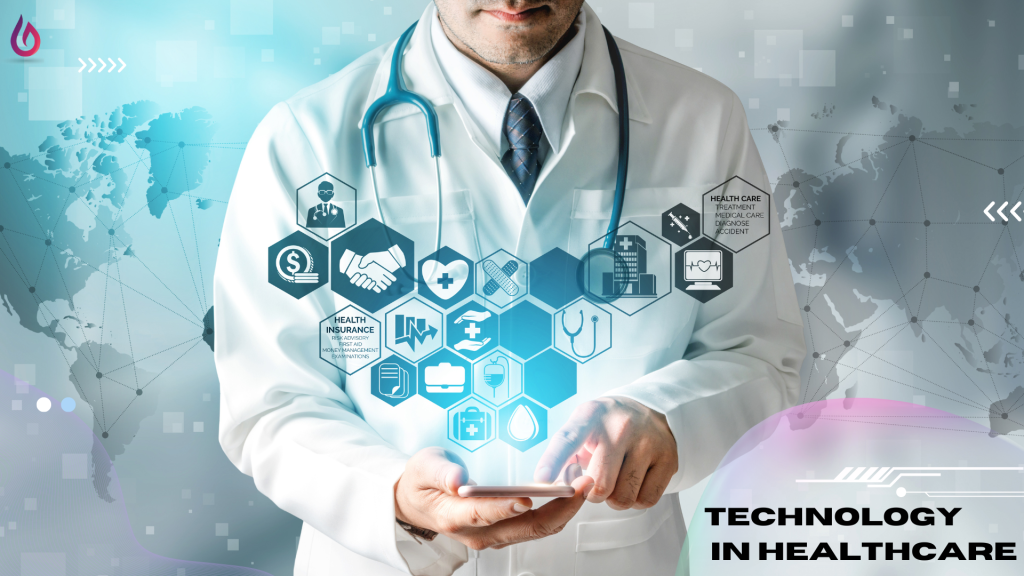Impact of Technology In Healthcare

The healthcare industry has not been exempt from the recent technological transformation that has affected many other industries. The use of technology in healthcare has improved patient care, increased productivity, and changed how healthcare personnel work, among other things. Technology has had a big impact on the healthcare sector, from telemedicine to electronic health records. In this blog, we’ll look at five significant effects of technology in healthcare and how they’re influencing the field’s future.
Improved Patient Care:
By giving healthcare workers access to precise and current patient data, technology has significantly benefited patient care and outcomes. Healthcare providers may now easily save, update, and get access to patient information thanks to the electronic health records (EHRs) that have taken the place of older paper-based systems. EHRs not only speed up diagnosis and treatment but also lower the chance of mistakes and improve teamwork within the medical industry. Additionally, wearables and technology-enabled gadgets are enabling patients to take an active role in their personal care, monitor vital signs, and manage chronic illnesses more successfully.
Telemedicine & Remote Healthcare:
Patients can get medical advice and treatment remotely thanks to telemedicine, a sector that has grown quickly as a result of technical improvements. Through video conferencing, patients can contact medical specialists without making an in-person appointment, removing distance obstacles and relieving pressure on healthcare facilities. Telemedicine is particularly helpful for people who live in remote locations, have mobility problems, or need to see a doctor again. During the COVID-19 pandemic, telemedicine’s convenience and accessibility have proven crucial for maintaining healthcare services while lowering the danger of transmission.
Precision Medicine and Personalized Treatment:
Technology has opened the path for precision medicine, a method that customizes medical interventions and treatments to a person’s particular genetic make-up, environment, and lifestyle. Healthcare practitioners may now recognize certain genetic markers and variants linked to diseases because to developments in genetic sequencing technologies and bioinformatics. A personalized approach to diagnosis, therapy, and preventive actions is made possible by this information. Huge volumes of genomic data can be analyzed to help doctors anticipate disease risk and treatment response more accurately, improving patient outcomes and lowering side effects.
AI and Machine Learning in Healthcare:
Artificial intelligence (AI) and machine learning algorithms are revolutionizing the healthcare industry by automating procedures, analyzing intricate medical data, and supporting decision-making. These tools can glean information from copious volumes of patient data, such as medical records, pictures, and academic publications. Algorithms for machine learning can help in early disease identification, treatment response prediction, and plan optimization. By increasing efficiency and accuracy, AI-powered diagnostic systems have demonstrated considerable potential in a number of disciplines, including dermatology, pathology, and radiology. AI has the ability to completely change how healthcare is delivered by enhancing the skills of healthcare practitioners.
Health Monitoring and Preventive Care:
Thanks to technology, people may now track their health and wellbeing proactively with a variety of wearable gadgets and health monitoring software. These gadgets, which range from smartwatches to fitness trackers, can keep an eye on things like vital signs, physical activity, and sleep habits. People can improve their overall health and make wise decisions to enhance their well-being by gathering and analysing this data. Healthcare professionals can also use this technology to pinpoint potential health problems, make tailored recommendations, and promote preventive care practises. The possibility for lowering healthcare expenditures and improving general population health exists with this proactive approach to healthcare.
In conclusion, technology has had a significant impact on healthcare and is still reshaping the sector. The delivery of healthcare has been more effective, accessible, and accurate thanks to technology, which has improved patient care and results as well as personalized care and preventive care. New opportunities for diagnosis, treatment, and patient engagement have emerged with the merging of telemedicine, precision medicine, artificial intelligence, and health monitoring devices.

